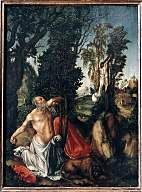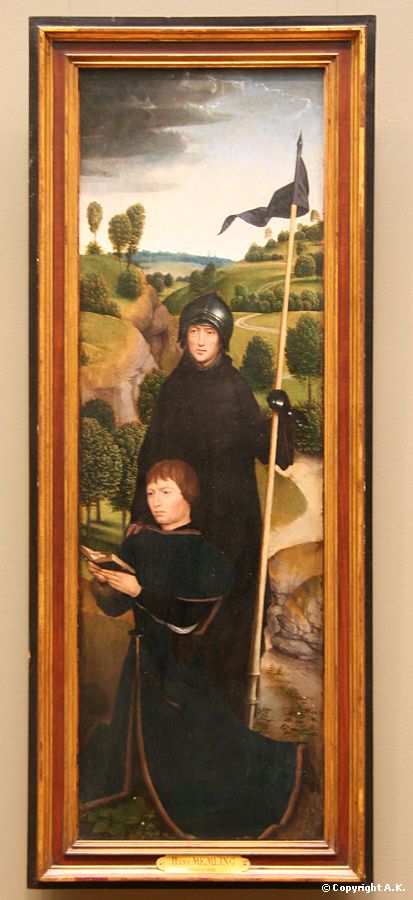Today, February 10, we celebrate the feast of Saint William of Maleval (also known as William the Hermit and William the Great, died 1157), hermit, prophet, miracle-worker, and founder of the Williamites, a branch of the Hermits of Saint Augustine.
Little is known about the early life of William, who is thought to have been born in France. His youth and young adulthood were spent in the army, living freely and licentiously, common among soldiers of that time period. Through the grace of God, William came to understand the error of his ways, and becoming penitent, made a pilgrimage to the tombs of the holy apostles in Rome. There, he begged an audience with Pope Eugenius III, and upon receiving it, implored the Holy Father for pardon and prescriptive penance for his sinfulness.
Pope Eugenius encouraged William to make a pilgrimage to the Holy Land in 1145. William did as he was told, and spent eight years journeying through the deserts of the Holy Land, visiting tombs, shrines, and holy places, and communing with the desert hermits and learned scholars. Returning to Rome a changed man, he embraced the eremitical life, becoming a hermit on the isle of Lupacavio (near Pisa) in Tuscany. Wishing nothing more than to live in solitude and contemplate the Lord’s mercy and forgiveness, William found himself besieged by pilgrims and those seeking his spiritual counsel and guidance. He was convinced to lead and govern these pilgrims, but found himself poorly suited for this task, and failed to maintain discipline and austerity among the monks in his care. Unable to bear this, he traveled to Monte Bruno, where the same situation repeated itself. This time, he fared little better, although organized the monks into an abbey.
Again, he withdrew from governing, realizing that God’s plan for him was elsewhere. He embraced life as a hermit at Maleval (near Siena). There, he lived in an underground cave until a local lord built him a cell. William kept company with the wild beasts of the region, and foraged for his food. He undertook extreme penances and austerities, in atonement for his earlier sinfulness. Sleeping only on the bare ground, eating only uncooked foods he could gather, and drinking limited amounts of water, he devoted his waking moments to prayer, contemplation, and manual labor. William also developed the gift of miracle-working and prophecy, for which he was frequently sought.
Saint William accurately predicted his death, and he was buried by two disciples in his garden. These disciples, Albert and Renauld, continued to live and study together according to Saint William’s example. There numbers increased, and they built a chapel and hermitage over their founder’s grave. The order, the Hermits of Saint William, spread throughout Europe, and were known as the “Bare-Footed Friars.” Eventually, the order was incorporated into the Hermits of Saint Augustine, but their tradition continues to this day.
Saint William’s life is marked by conversion, forgiveness, and penance. We are reminded that we have all sinned, sometimes gravely, but that through the grace of God, we are made new and forgiven. Throughout his life, Saint William never took the saving grace of the Lord for granted, spending his days in contemplation and wonder at the mercy and love of God. We are called to do the same, recognizing our own sinfulness, and humbly and contritely asking the Lord for forgiveness. Freed from the burden of our sins, like Saint William, we may find a world full of the beauty of God’s creation!
Psalm 51: David's Prayer of Repentance
1 Have mercy on me, O God,
according to your unfailing love;
according to your great compassion
blot out my transgressions.
2 Wash away all my iniquity
and cleanse me from my sin.
3 For I know my transgressions,
and my sin is always before me.
4 Against you, you only, have I sinned
and done what is evil in your sight;
so you are right in your verdict
and justified when you judge.
5 Surely I was sinful at birth,
sinful from the time my mother conceived me.
6 Yet you desired faithfulness even in the womb;
you taught me wisdom in that secret place.
7 Cleanse me with hyssop, and I will be clean;
wash me, and I will be whiter than snow.
8 Let me hear joy and gladness;
let the bones you have crushed rejoice.
9 Hide your face from my sins
and blot out all my iniquity.
10 Create in me a pure heart, O God,
and renew a steadfast spirit within me.
11 Do not cast me from your presence
or take your Holy Spirit from me.
12 Restore to me the joy of your salvation
and grant me a willing spirit, to sustain me.
(Psalm 51: 1-12)
Year 2: Day 41 of 365
Prayer Intentions: True repentance.
Requested Intentions: Reconciliation of a marriage (D); Assistance with a legal matter, financial freedom (R); Healing for a friend (M); For a son in medical school (H); Financial assistance (M); Successful employment (N): Freedom from mental illness for a friend (L); For successful marriage (N); For friends having and recovering from surgery; for the reduction of a brain tumor (L); For resolution of a housing crisis (P); For a brother who is struggling financially, for a son who is struggling academically (B); For financial security for a friend (C); Success in business; familial happiness and health (J); Health and recovery of a sister (I); Development of a chaste relationship pleasing to the Lord (E); Successful surgery of mother; delivery of daughters’ babies (L); For a friend suffering with depression (M); For a friend entering religious life (R); Success of a parish men’s retreat (H); For a mother who is grieving; for the soul of a dearly departed son (M); Reconciliation of a marriage (M); End to grief after death of son (B&C); End to grief (S); Successful marriage (N); For an RCIA candidate struggling with financial and family stressors (O); Freedom from anxiety regarding medical procedure (J); Return home of an ill mother, peace and financial security (J); Healing of a father following stroke (S).
Why pray the Rosary every day for a year?
Each time the Blessed Virgin has appeared-- whether it be to Saint Bernadette Soubirous at Lourdes; to Lucia, Jacinta, and Francisco at Fatima; or to Mariette Beco at Banneux-- she has asserted the importance, saving grace, and power of praying the Holy Rosary on a daily basis. Based upon her words, the Rosary is penance and conversion for sinners, a pathway to peace, an end to war, and a powerful act of faith in Jesus Christ. Pope Paul VI presented the Rosary as a powerful means to reach Christ "not merely with Mary but indeed, insofar as this is possible to us, in the same way as Mary, who is certainly the one who thought about Him more than anyone else has ever done."
To show us how this is done, perhaps no one has been more eloquent than the great Cardinal Newman, who wrote: "The great power of the Rosary consists in the fact that it translates the Creed into Prayer. Of course, the Creed is already in a certain sense a prayer and a great act of homage towards God, but the Rosary brings us to meditate again on the great truth of His life and death, and brings this truth close to our hearts. Even Christians, although they know God, usually fear rather than love Him. The strength of the Rosary lies in the particular manner in which it considers these mysteries, since all our thinking about Christ is intertwined with the thought of His Mother, in the relations between Mother and Son; the Holy Family is presented to us, the home in which God lived His infinite love."
As Mary said at Fatima, "Jesus wants to use you to make Me known and loved. He wishes to establish the devotion to My Immaculate Heart throughout the world. I promise salvation to whoever embraces it; these souls will be dear to God, like flowers put by Me to adorn his throne."

Subscribe to:
Post Comments (Atom)













0 comments:
Post a Comment
Thanks for leaving a comment. If you wish to submit a prayer request, however, please do so above, using the "Contact" tab.